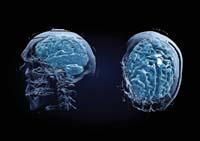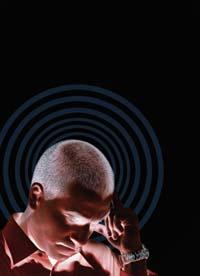Background of depression
2007/02/01 Rementeria Argote, Nagore - Elhuyar Zientziaren Komunikazioa Iturria: Elhuyar aldizkaria

Imanol Kerejeta is a psychiatrist at the Hospital of Donostia and since his consultation many depressive patients pass. According to Kerejeta, "pathological sadness must last at least two weeks and be deep, internal." This is the most obvious symptom, but there are other symptoms to diagnose depression. There are some criteria for diagnosis; "there is a list of symptoms and if you have four or five of these symptoms it is said to be a pathological sadness: sleep problems, appetite problems, weight loss, libido loss, lack of desire to do everyday things, lack of bed, lack of mood..."
Psychiatrists work face to face with the disease, see the emotions and symptoms of the patient, and try to cure them. But psychiatrists are not alone in the fight against depression, among them neurologists. For Kerejeta, "we must expand the relationship of psychiatry with neurology. Both neurologists and us have the same workplace: the brain. But we study it from an emotional perspective, we are prepared for it." And neurologists study the physiological perspective.

Neurologists tend mainly to the limbic brain system. The limbic system is responsible, among other things, for emotions, sexual desire and the response to stress. The limbic system is formed by several structures. On the one hand are the amygdala and the hippocampus, which control emotions like fear. On the other hand, the hypothalamus, which in addition to regulating sleep, hunger, sexual desire and protection against stress, also controls the pituitary gland and, therefore, regulates various hormones.
Hormones and the endocrine system in general also investigate to learn about depression. In fact, some depressive patients, despite having healthy endocrine glands, have observed unusual hormone levels in the blood. And they believe that it is possible that the lack of hunger or sleep of the sick is a consequence of this.
To the thread of antidepressants
Many advances have been made by pulling the antidepressant thread to know what depression is basically. That is, to see that a drug has an antidepressant effect and to look for the changes it has produced in the brain, the 'improvements' it has made. Following the history of antidepressants is almost looking at the history of the knowledge of depression, which is united.

This antidepressant was an inhibitor of monoamino oxidase and the antidepressants coming from behind used the same strategy, that is, they regulated the level of the neurotransmitters noradrenaline and cerebral serotonin. Knowing the biochemical strategy of those first antidepressants, it became clear that depression was a mental illness and they realized that, due to the presence of neurotransmitters, at the base there was a decrease in the connections between the neurons of the brain.
Because at the same time they found another type of antidepressant. At random, since in a study of antipsychotic drugs they realized their antidepressant effect. It was imipramine.
The antidepressants of the same group that came to the thread of imipramine were more effective than the previous ones, but they had unpleasant side effects (dry mouth, tarnishing of sight, cushioning of the head...); both they and these were dangerous if they were taken at high doses or mixed with other medications; and considering that some depressive patients usually have occurrences of suicidal drugs, it was important that the depressants were safe.

With this intention, came the inhibitors of the recovery of serotonin. These also helped maintain neurotransmitters (in this case serotonin) at an adequate level. The first was zimelidine, followed by fluoxetine (better known as Probac), paroxetine and the rest.
These are the most commonly used antidepressants today (these and other inhibitors that have come along the same route: the recovery of noradrenaline and the commons, serotonin and noradrenaline). They are very effective, improve the patient's mood but overdose is not so dangerous and side effects are much more bearable. Knowing the physiological effect of these antidepressants, they constituted the first solid theory to explain depression.
Classical theory Classical theory
Classical theory is called the monoaminergic theory of depression. Monoaminergic by corresponding to the monoaminergic system, that is, to the neurotransmitters monoamine. According to this theory, the key to the efficacy of antidepressants is in neurotransmitters, since they help maintain the level of neurotransmitters in neuronal synapsis. Consequently, depression is an imbalance of neurotransmitters, especially of serotonin and noradrenaline.

But as more antidepressants appear, experts have discovered that this theory is not at all accurate. There are three main reasons to say so. First, some antidepressants do not affect the monoamine system. Second, some compounds that help maintain high levels of neurotransmitters have no antidepressant effect on patients. And, thirdly, the effect of the antidepressants that maintain the levels of neurotransmitters is manifested a few weeks after the beginning of treatment, although it affects the monoamine system almost immediately.
Therefore, neurotransmitters do not have the key to everything: depression is a very complex situation. And they have observed that, in addition to alterations of neurotransmitters, morphological and functional alterations also occur in various parts of the brain, especially in the hippocampus. For example, cells are lost, dendrites and receptors of neurons are reduced, etc.
Path of stress

Nor is it easy to determine the origin of depression. In some cases they have seen that it is related to stress. After a situation of stress, they realize that sometimes depression arrives. This stress situation can be serious (workplace harassment, domestic violence, death of a family member...), but it doesn't have to be so.
Whatever the reason, when a person shudders, is very active and therefore has trouble sleeping, anorexia (no hunger), etc. Stress affects the whole body and especially the brain. In a way, the medium is in biochemical imbalance. It seems that the body, trying to cope with this stress, adapts to the imbalance and in that effort can reach a situation of depression.
As you see, depression is much more complex than you originally thought, it has several origins and symptoms could be many. It is also possible that at the base not all depressions are equal -- in fact there are several types of depression. Therefore, research on the basis of depression is fundamental to the search for adequate treatments, such as more effective drugs. Thus, the research field of depression has been considerably expanded. The University of the Basque Country, for example, is investigating depression through multidisciplinary teams.
In the Department of Pharmacology of Leioa, for example, in the group of Javier Meana, they investigate the physiological basis of psychiatric diseases, including depression associated with stress. For this purpose, they use rats, directly analyze the human brain through samples, etc.

Erroneous thoughts
The tendencies to depression can go hidden in the genes, but to a large extent it manifests itself in the character of the person. And it is that those who tend to depression usually have erroneous thoughts: they feel guilty, they do not want themselves, they are worried because they think it hurts others, they have no hope of improving... This thought is nothing healthy and the patient must correct it if he wants to cure it.

Therefore, in addition to pharmacological treatment, psychotherapy is often of great help. The patient receives the advice of the psychotherapist. He sends you exercises so that you first look at your way of thinking and then take the habit of having a healthier mindset.
It is not an easy task for the patient or for the specialist to undergo treatment. Depression is a complex disease in itself and all patients are different: symptoms, personal situation, internal strength and help from others, all of them different. Consequently, the psychiatrist also adapts treatment to each patient. They are trained to do so.




Gai honi buruzko eduki gehiago
Elhuyarrek garatutako teknologia






